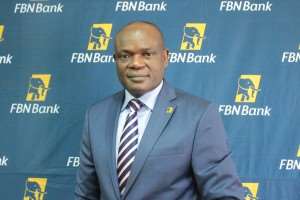
Universal banks operating in the country have been urged to consolidate their operations to increase their capital for huge transactions.
The move, if properly undertaken will strengthen the banking industry to withstand shocks and offer the best for Ghana's development, Managing Director of FBNBank, Gbenga Odeyemi told Citi Business News in an interview.
Mr. Odeyemi indicated that with the current size of the country's banking sector, mergers will be a healthy move for the Ghanaian economy.
“The banking space in Ghana is very broad and right now we have about 31 banks and from what we are told there could be more. As time goes on you are likely to see merger and some acquisitions taking place within the banking space,” he predicted.
Citing Nigeria as an example, Mr. Odeyemi noted that at a point in time, the country had 90 banks but the regulator made an effort to have banks with big balance sheets merge with smaller ones for capital intensive projects.
“That was good for the economy. The central bank will have to consider increasing the capital base for the banks in Ghana to have the muscle to be part of transactions like the cocoa syndicated loan” he advised.
He maintained that consolidation of the 31 banks in the country will give them strong balance sheets to fund big transactions, particularly for public projects like housing, electricity and water.
Ghana's banking sector
With a minimum capital reserve of 120million per universal bank, some banking analysts have said banks in the country are not large enough to undertake big transactions.
In addition to the commercial banks, there are about 35 savings and loans companies and over 400 microfinance institutions in the country, providing financial services to less than 30 percent of the 26.5 million people.
While banks are stoical over engineered mergers and acquisition, they believe that there needs to be some sort of growth in the banking sector in terms of deposits that will be triggered by growth in economic activity.
Ghana's economy
The Ghanaian economy is currently going through some challenges, after a period of instability.
The country was hit by a series of external and domestic shocks which have shaken its economic fundamentals.
Consequently, international reserves have dwindled, even though the cedi has relatively stabilized for a period of time.
A major obstacle to the restoration of macroeconomic stability in Ghana is the level and composition of government debt.
It is envisaged that the three-year International Monetary Fund (IMF) programme will restore the economy back on track.
–
By: Norvan Acquah – Hayford/citibusinessnews.com/Ghana




 Former Kotoko Player George Asare elected SRC President at PUG Law Faculty
Former Kotoko Player George Asare elected SRC President at PUG Law Faculty
 2024 elections: Consider ‘dumsor’ when casting your votes; NPP deserves less — P...
2024 elections: Consider ‘dumsor’ when casting your votes; NPP deserves less — P...
 You have no grounds to call Mahama incompetent; you’ve failed — Prof. Marfo blas...
You have no grounds to call Mahama incompetent; you’ve failed — Prof. Marfo blas...
 2024 elections: NPP creates better policies for people like us; we’ll vote for B...
2024 elections: NPP creates better policies for people like us; we’ll vote for B...
 Don’t exchange your life for wealth; a sparkle of fire can be your end — Gender ...
Don’t exchange your life for wealth; a sparkle of fire can be your end — Gender ...
 Ghana’s newly installed Poland train reportedly involved in accident while on a ...
Ghana’s newly installed Poland train reportedly involved in accident while on a ...
 Chieftaincy disputes: Government imposes 4pm to 7am curfew on Sampa township
Chieftaincy disputes: Government imposes 4pm to 7am curfew on Sampa township
 Franklin Cudjoe fumes at unaccountable wasteful executive living large at the ex...
Franklin Cudjoe fumes at unaccountable wasteful executive living large at the ex...
 I'll 'stoop too low' for votes; I'm never moved by your propaganda — Oquaye Jnr ...
I'll 'stoop too low' for votes; I'm never moved by your propaganda — Oquaye Jnr ...
 Kumasi Thermal Plant commissioning: I pray God opens the eyes of leaders who don...
Kumasi Thermal Plant commissioning: I pray God opens the eyes of leaders who don...
